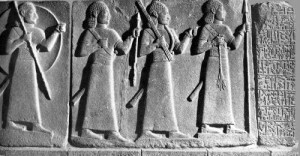 When Professor Nicolò Marchetti of Bologna University found out that his team had won a bid to excavate in the ancient city of Karkemish beating a Japanese group that had offered to pay $1 million, the news came as mixed blessings – we assume. In 2011, for the first time since the Turkish War of Independence, a joint team of Italian and Turkish archaeologists returned to Karkemish, an ancient city on the Syria-Turkey border, building on the work of British Museum teams that included T.E. Lawrence, who later became famous as “Lawrence of Arabia”.
When Professor Nicolò Marchetti of Bologna University found out that his team had won a bid to excavate in the ancient city of Karkemish beating a Japanese group that had offered to pay $1 million, the news came as mixed blessings – we assume. In 2011, for the first time since the Turkish War of Independence, a joint team of Italian and Turkish archaeologists returned to Karkemish, an ancient city on the Syria-Turkey border, building on the work of British Museum teams that included T.E. Lawrence, who later became famous as “Lawrence of Arabia”.
Marchetti, a sort of new version of Indiana Jones as described by the New York Times is surely the only archeologist in the world as we know- digging for national heritage under the watchful eye of al-Qaeda machine guns where the everyday events include seeing pick-up trucks with the black al-Qaeda flag packed with armed militias, passing just a few feet away from the site. The team is unearthing the mythical Hittite capital of Karkemish, which has been named in the Bible. On the banks of the Euphrates River, the excavation site spans the border between Turkey and war-torn Syria. The site was first discovered and briefly explored in the early 20th century. Karkemish now lies within a mine-infested military zone, 65% of it in Turkey and 35% in Syria.
What drives Marchetti to work in such conditions? Marchetti is proudest of a stele, or commemorative slab, carved with the face of Babylonian King Nebuchadnezzar, the conqueror of Karkemish. He destroyed Jerusalem and the Temple of Salomon in 587 BC, and built the Hanging Gardens of Babylon, which were the seventh wonder of the ancient world. Marchetti who reportedly speaks the native language and is highly respected by the local people, hopes to conserve the area and most likely help the Turkish government to apply for the UNESCO National Heritage designation. He hopes for the creation of a national park that covers the archaeological site and the natural beauty of the nearby river.
Last year, an Associated Press (AP) wire story about Karkemish shone new light on the site, from its ancient history as a strategic city along the Euphrates held by the Mitanni, Hittite and Neo-Assyrian Empires, to the artifacts and remains of palaces and temples uncovered by the British archaeologists in the early 20th century, to Marchetti’s team’s plans to open Karkemish to the public in 2014.















